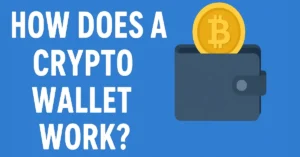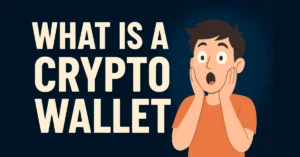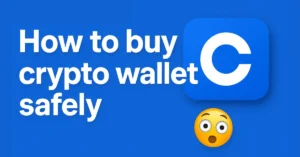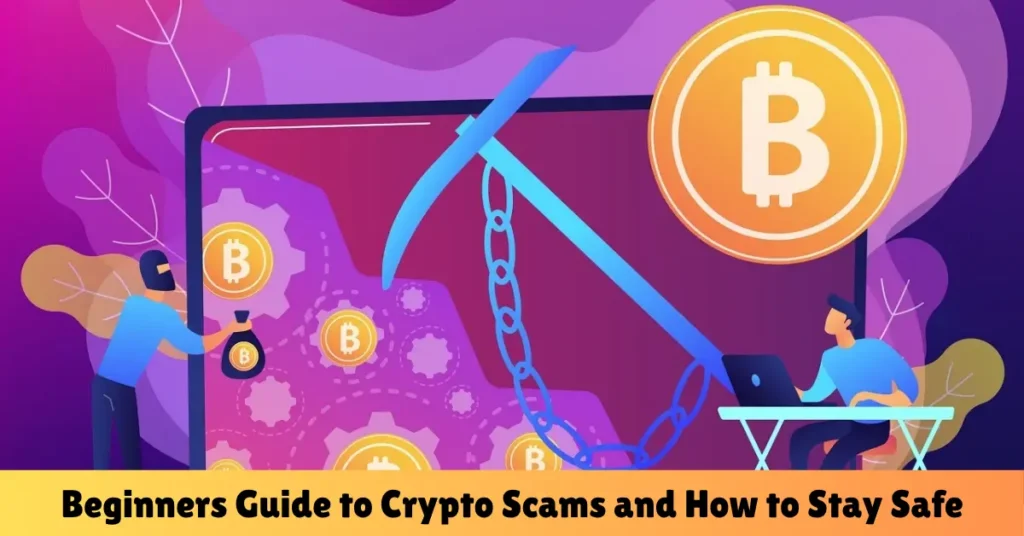Beginners Guide to Crypto Scams and How to Stay Safe
Introduction
Cryptocurrency is becoming more and more popular every day. Many people are excited to invest and learn about digital coins like Bitcoin, Ethereum, and others. But with this growing interest, scammers are also getting smarter and finding new ways to trick beginners.
If you’re just starting in the crypto world, it’s important to know how to protect yourself. This blog is your beginner-friendly guide to understanding common crypto scams and learning how to avoid them. We’ll simply explain everything—no technical jargon—so you can stay safe while exploring the exciting world of cryptocurrency.
What Are Crypto Scams?
Crypto scams are tricks used by fraudsters to steal your cryptocurrency or personal information. These scams can happen in many ways—through fake websites, emails, social media messages, or even phone calls.
The main goal of these scammers is to get access to your digital wallet, private keys, or make you send them your crypto. And since most cryptocurrency transactions are permanent and can’t be reversed, it’s very hard to get your money back once it’s gone.
Crypto scams often look real and trustworthy, which is why so many people fall for them. That’s why it’s important to learn how these scams work, especially if you’re new to the crypto world.
Common Types of Crypto Scams

If you’re new to crypto, it’s important to know the different ways scammers might try to trick you. Here are some of the most common types of crypto scams and how they work:
Phishing Scams
Phishing scams happen when scammers create fake websites, apps, or emails that look like real crypto platforms. They try to make you enter your private keys, passwords, or wallet information so they can steal your crypto.
How to stay safe:
- Always double-check website links.
- Never enter sensitive information on suspicious websites.
- Use official apps and bookmarks for trusted platforms.
Fake Giveaways
These scams usually appear on social media. You might see a post claiming that a celebrity or crypto company is giving away free crypto. To join, they ask you to send a small amount first, but once you send it, you never get anything back.
How to stay safe:
- Remember, real giveaways don’t ask for money.
- Avoid offers that sound too good to be true.
- Check official social media accounts for announcements.
Pump and Dump Schemes
In this scam, a group of people promotes a cheap cryptocurrency to quickly raise its price. Once others buy in and the price goes up, the scammers sell their coins and leave. This causes the price to crash, and the new investors lose money.
How to stay safe:
- Be cautious of sudden hype around unknown coins.
- Don’t follow investment advice from strangers or influencers.
- Research before buying any coin.
Ponzi and Pyramid Schemes
These scams promise high returns if you invest and bring in new people. The money from new investors is used to pay earlier ones, not from actual profits. These schemes collapse when there are no new recruits.
How to stay safe:
- Avoid any project that offers guaranteed profits.
- Be suspicious if you’re asked to invite others to earn more.
- Research the business model and team behind a project.
Impersonation Scams
Scammers pretend to be someone you trust, like a crypto expert, company representative, or customer support agent. They reach out through social media or messaging apps and ask for money or personal details.
How to stay safe:
- Don’t trust anyone who contacts you first and asks for crypto.
- Verify their identity through official websites or channels.
- Never share your wallet details or private keys with anyone.
Red Flags to Watch Out For
Spotting a scam early can save you from losing your crypto. Here are some common warning signs that should make you pause and think before taking any action:
Guaranteed High Returns
- If someone promises that you’ll make quick or guaranteed profits with no risk, it’s likely a scam. In the real world, no investment is 100% safe or guaranteed.
Pressure to Act Quickly
- Scammers often create a sense of urgency. They may say, “Offer ends in 1 hour!” or “Only a few spots left!” This is a trick to rush you into making decisions without thinking.
Unprofessional Websites or Whitepapers
- Many scam projects have poorly made websites or whitepapers full of errors, fake team members, or missing contact information. A legitimate project will look professional and provide transparent details.
Requests for Private Keys or Seed Phrases
- No one—not even customer support—should ever ask for your private key or recovery phrase. If someone asks, it’s a scam.
Unknown or Anonymous Team
- If the people behind the crypto project don’t share real names, photos, or backgrounds, it’s a red flag. Trustworthy projects usually have a transparent team.
Overhyped Promotions
- If you see too much hype, especially on social media, with no solid explanation of how the project works, be cautious. Scammers often rely on hype to trick people into investing.
No Real Product or Purpose
- Some scams don’t offer anything useful—just vague promises. If the project doesn’t clearly explain what it does or how it solves a real problem, think twice before investing.
These red flags are your early warning signs. Trust your instincts—if something feels off, it’s better to stay away.
How to Stay Safe in the Crypto Space

Entering the world of cryptocurrency can be exciting, but it’s important to protect yourself from scams. Here are some simple and effective ways to stay safe:
Do Your Research (DYOR)
Before investing in any project, coin, or platform, take time to research:
- Check the team behind the project
- Read user reviews and expert opinions
Understand how the project works and what problem it solves
Use Trusted Wallets and Exchanges
- Stick to well-known and reputable crypto wallets and exchanges. Avoid unknown apps or websites that have little to no reviews or background information.
Keep Your Private Keys Private
- Your private key or recovery phrase is like the password to your crypto wallet. Never share it with anyone. No legit platform or person will ever ask for it.
Enable Two-Factor Authentication (2FA)
- Use 2FA for extra protection on your crypto accounts. This adds another layer of security and makes it harder for hackers to access your funds.
Be Careful on Social Media
- Scammers often pretend to be influencers, support staff, or companies. Don’t trust anyone who messages you first asking for money or offering “investment opportunities.”
Double-Check URLs and Apps
- Scammers create fake websites or apps that look real. Always double-check the website address or download apps from official sources only.
Stay Informed
- Crypto is a fast-changing space. Stay updated by following trustworthy crypto news sites, official blogs, and community forums. The more you learn, the better you can protect yourself.
Test with Small Amounts First
- If you’re unsure about a new platform or service, test it with a small amount first. Never invest more than you can afford to lose.
Being cautious doesn’t mean you can’t explore crypto—it just means you’re being smart and responsible. A little care can go a long way in keeping your investments safe.
FAQs – Crypto Scams and Staying Safe
What is a crypto scam?
A crypto scam is a trick used by fraudsters to steal your cryptocurrency or personal information. They may create fake websites, social media posts, or send you messages pretending to be someone trustworthy.
Can I get my money back if I fall for a scam?
Unfortunately, most crypto transactions can’t be reversed. If you send your crypto to a scammer, it’s very hard to recover it. That’s why prevention and awareness are so important.
How can I tell if a crypto project is a scam?
Look out for red flags like:
- Guaranteed high profits
- No clear information about the team
- Poor website or whitepaper
- Pressure to act quickly
- Always research before investing.
What should I do if I suspect a scam?
Stop all communication immediately. Don’t send any money or share your details. You can report the scam to platforms like the exchange you’re using or cybercrime authorities in your country.
Are all giveaways on social media fake?
Not all, but most are. Always double-check from official sources. If someone asks you to send crypto to get more in return, it’s a scam.
Is it safe to use free Wi-Fi for crypto transactions?
No, it’s risky. Public Wi-Fi can be unsafe, and hackers can intercept your data. Always use a secure internet connection when dealing with your crypto wallet or exchange.
Should I share my private key or seed phrase with customer support?
Never. No real customer support will ever ask for your private key or recovery phrase. If someone does, it’s a scam.
How do I keep my crypto wallet safe?
Use a trusted wallet
Never share your recovery phrase
Enable two-factor authentication
Store backup details in a secure place (offline)
Conclusion
Crypto is full of exciting opportunities but comes with risks, especially for beginners. You can safely explore the crypto world by learning about common scams and knowing how to protect yourself. Stay alert, do your research, and always think before you click or invest. A little caution can save you a lot in the long run.
Also read
- What is a Crypto Wallet and How Does It Work? – Coinsify
- 10 Crypto Terms Every Beginner Must Know – Coinsify
- What is Blockchain Technology – Complete Guide – Coinsify
- How to Buy Crypto Safely in 2025 – Complete Guide – Coinsify
- Bitcoin vs Ethereum: Key Differences Explained – Complete Guide
- Ultimate Blockchain Glossary: Learn Blockchain Terms Easily
- How to Buy Bitcoin Safely (Complete Beginner’s Guide)
- Top 10 Crypto Wallets for Beginners (2025 Edition)
- What is Cryptocurrency? A Beginner-Friendly Guide (2025)






